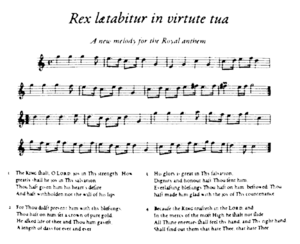Rex lætabitur in virtute tua
| English: The King shall rejoice | |
|---|---|
 The original publication of the modern setting of the anthem by Jeremy Clarke in 1742. | |
National anthem of | |
| Lyrics | Biblical |
| Music | Jeremiah Clarke, 1738 |
| Adopted | 1723 (words) 1789 (tune) |
Rex lætabitur in virtute tua, commonly shortened to Rex lætabitur and usually translated into English as "The King shall joy", is the national anthem of Great Nortend. The words are taken from the verses 1–2, 5–6 and 7–8 of Psalm 21, originally adapted for use as a liturgical Sequence hymn. The most commonly used tune was composed by the Nortish composer, Jeremy Clarke in 1742.
History
The origins of Rex lætabitur as a national or royal anthem date back to the mediaeval period when it was the Sequence hymn during the Coronation Mass. This was reaffirmed in the new revised Book of Rites of the Church of Nortend in 1713 by Henry V, following the publication of the official authorised St Edmund's Bible in 1704. After it was declared a “worthy song” by Henry V in 1723, it was included in the Book of Chaunts in 1730 as the Sequence for Accession Day, which is celebrated annually on the anniversary of the Coronation.
In the Book of Rites and the Book of Chaunts, a plain chaunt melody was prescribed for the singing of the Sequence. In common with much of the liturgy of the Church of Nortend, 'figured' chaunts were almost immediately composed for Rex lætabitur, adapting the plain chaunt melody with harmonies.
The use of the Sequence as a popular hymn arose during the 18th and 19th centuries. It was frequently sung at royal processions and parades. James Clarke, a well-known sacred and secular composer in Great Nortend during the late 18th century, set the text of the hymn in scene of one of his operatic plays, sung by the crowds as they see their King. It quickly became known as the Trumpet Tune, and was published soon after as "A new melody for the Royal Anthem" in 1781. The setting gradually gained popularity, especially after it was played by the State Trumpeters upon the presentation of Catherine I to her people after the Coronation Mass in 1789. It was adopted as the musical royal salute in the 19th century, and began to be played at civic, government and institutional functions, gaining the character of a de facto national anthem and hymn.
Use today
Rex lætabitur is nowadays the de facto national anthem of Great Nortend, in addition to the royal anthem for the Sovereign. It is used in a wide variety of contexts, both to inculcate patriotism and loyalty to King and country, as well as to honour God and His chosen Sovereign. The hymn is sung at schools, parades and ceremonies such as the raising and lowering of the flag. It is used at international sporting events, and played at the beginning of films. It is also played at the start and end of wireless radio transmissions.
Certain traditions have developed over its use, in line with other countries' anthems, such as standing during its playing. Men are expected to remove their hats as well, and women to keep their heads covered. Certain officials may be expected to salute a royal symbol such as the flag, Royal portrait, or coat of arms during the playing of the anthem. Usually, the assembled crowd will sing the anthem.
In liturgical use, generally on Accession Day, the Sequence is chaunted to either the plain chaunt or a figured chaunt setting. Certain elements from the Clarke setting of the anthem have been incorporated into the most well-known figured chaunt setting by Braken, especially the introductory motif of four trumpet blasts descending in pitch.
Text
The King shall joy, O Lord, in Thy salvation,
Exceeding glad shall he be of Thy strength.
The bidding of his lips Thou hast not withheld from him,
And hast giv'n him the longings of his heart.
For great his glory is in Thy salvation,
Thou hast honour and worship laid on him.
For Thou shalt bestow everlasting blessings on him,
And make him with thy count’nance glad with joy.
Because the King put’th in the Lord his trusting,
Through th’mercy of the High’st he shall not be moved.
For all Thine enemies shall apprehend Thy hand and,
All them that hate Thee, shall Thy right hand find.
This page is written in Erbonian English, which has its own spelling conventions (colour, travelled, centre, realise, instal, sobre, shew, artefact), and some terms that are used in it may be different or absent from other varieties of English. |

